
MUD HENS SEASON PREVIEW
Love your Hens? Thank Ned Skeldon
Team begins 50th season since resurrection led by Skeldon
4/3/2014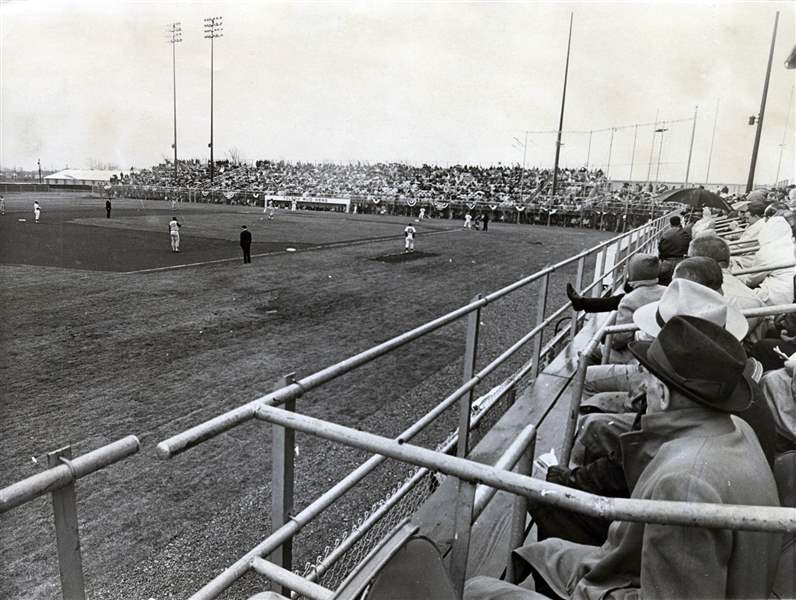
A crowd of 5,198 fans greeted the Mud Hens when they returned on April 17, 1965, for opening day against Toronto at the Lucas County Recreation Center in Maumee.
THE BLADE
Buy This Image

In late 1955, Toledo baseball got slapped by an unexpected double whammy.
Within weeks of a season-ending doubleheader split against Indianapolis at Swayne Field, the Milwaukee-based owner of the city’s American Association franchise moved it to Wichita, Kan. And almost overnight, so it seemed, the venerable but dilapidated old ballpark on the northwest corner of Monroe Street and Detroit Avenue, once one of the game’s showplaces, met the wrecking ball and was reduced to rubble.
Baseball’s future in Toledo was anything but bright. When the original Mud Hens left in midseason of 1952, spirited out of town in the dead of night to Charleston, W.Va., fans were disappointed bordering on angry. When it happened again to a team nicknamed the Sox a few years later, followed by the swift death of Swayne Field, there was little public outcry. A proposed bond issue to build a new municipal stadium with the intention of luring another minor league team to town was overwhelmingly rejected by voters.
READ MORE: Mud Hens 2014 season preview
But there was one man who refused to let go. Some called him a visionary, others thought him foolish. His name was Ned Skeldon, then Toledo’s vice mayor, and he made clear his mission late in ’55. “My main interest now,” he said, “is helping Toledo get another baseball team. Toledo is a good baseball town. Don’t forget it.”
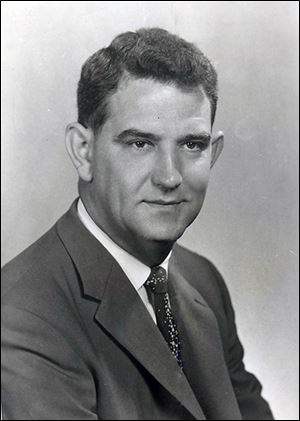
Ned Skeldon, in 1965, led the drive to bring baseball back to Toledo.
Skeldon never did. It took him nearly a decade and a lot of maneuvering and sleight of hand as a Lucas County commissioner, but on April 17, 1965, at a makeshift sort of stadium in Maumee whose fairly antiquated main grandstand was leftover from a county fairgrounds horse racing track, a new team rechristened as the Mud Hens beat the Toronto Maple Leafs 3-2 before 5,198 soaked, chilled, and wind-whipped fans.
On Friday, the 2014 Hens will open their season against Louisville downtown at Fifth Third Field. It will mark the 50th season of baseball since its return to Toledo, even if by way of Maumee. And, yes, that odd old stadium is still standing on the grounds of the Lucas County Recreation Center. It served the Hens and their fans for 37 seasons, and in June of 1988, several months before his death, Ned Skeldon and some 7,000 appreciative fans attended pregame ceremonies to rename the stadium in his honor. To this day, with some shorthand involved, it is affectionately known as The Ned.
Remember, though, all that was on that site in the early ’60s was the fairgrounds racetrack and grandstand that harness racing abandoned for the newer Raceway Park in North Toledo. Known as Fort Miami, it was six decades old by then and anything but fancy. If Skeldon was going to turn it into a baseball stadium he had to somehow back-door the project. He accomplished it by creating — with the help of agreeable fellow county commissioner Bill Gernheuser, who gave Skeldon at least a 2-1 vote every step along the way — a new Rec Center.
They took a basically unused 75-acre parcel of county-owned land next to the fairgrounds on Key Street and pushed through a $350,000 project that included a complex of four lighted softball fields with a common building in the center for press boxes, restrooms, and concessions. There would be a swimming-diving complex, a quarter-midget race track, amateur baseball fields, football and soccer fields, tennis courts, and eventually several event halls of various sizes. It was dedicated in July of 1963; just about everything except the pool still exists and still is in use.
And the stadium? Skeldon found a tenant in the semi-pro Toledo Tornadoes football team and, thus, could justify sneaking a few dollars from one recreation fund or another to begin improving and expanding on the old structure.
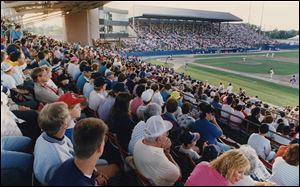
A crowd packs Ned Skeldon Stadium on Aug. 20, 1992, to watch the Mud Hens. The team played there until moving downtown to Fifth Third Field in 2002.
When the facility opened there was a lighted football field laid out in front of stands that seated about 6,000. But if Skeldon had his way, if he realized his dream, it wouldn’t be like that for long. When he closed his eyes, he saw an expansive baseball stadium there. He went looking for a team, and on the last day of November, 1964, he found one. The Richmond Virginians of the International League would move to northwest Ohio in ’65 as the Triple-A affiliate of the New York Yankees.
That very night Skeldon and his baseball committee on the county recreation board — civic, business, and sports leaders like Henry Morse, Steve Stranahan, Monsignor Jerome Schmit, Red Smith, and Chuck Chuckovits — met to discuss stadium expansion to more than 10,000 seats, hiring a general manager to run the team, finding office space, putting together a ticket sales plan, etc. The team, decreed Skeldon, would be called the Mud Hens.
When asked recently if the creation of LCRC was something of a benevolent ruse by Skeldon to fund the transformation of the fairgrounds grandstand into a stadium, Charles Bracken chuckled and said, “I don’t know that I’d put it that way. But if it hadn’t been for the Rec Center the Mud Hens wouldn’t be here. Ned did love baseball.”
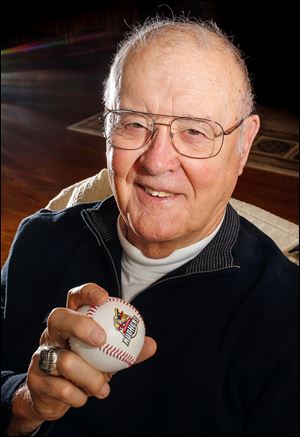
Charles Bracken has been connected with the Mud Hens since they returned in 1965.
Bracken, in his 80s and living in Sylvania, is perhaps the sole “insider” link from the Hens of ’65 to the Hens of today. He was a partner at Arthur Young & Company, the accounting firm that was hired to do tax planning for the baseball organization. Henry Morse, who chaired early meetings, wanted someone from Arthur Young to attend monthly Board of Trustees meetings, and Bracken was his firm’s designee. He served in that nonmember capacity for 13 years. In 1978, at about the same time Bracken left Arthur Young to become an executive with a local savings and loan, Red Smith died and Bracken was elected to the Mud Hens’ board to replace him.
“I’m still on it,” Bracken said, laughing. “I guess you gotta die to get off of it.”
Bracken isn’t complaining, mind you. He’s happy to be alive and well. Plus, he has long been a baseball fan and usually attends about 50 Hens home games a year.
He recalls that the new operation started with a $75,000 bank loan and that $70,000 of it went to purchase the franchise from its Richmond owner. That left $5,000 for operational start-up expenses, and that pretty much set the financial tone for at least the first decade of the club’s existence in Maumee. In fact, if Bracken is surprised that the team is about to start its 50th season, it is only because he was a bit dubious it would survive its first 10.
“We didn’t make much money,” Bracken said. “Consider that we didn’t have shareholders, we didn’t have investors, attendance was awful … we just didn’t have much capital. It was a big problem. In 1978, Gene Cook became general manager, and the team had an accumulated net worth of just $50,000 after about 12 years of operating. It wasn’t much. For quite a while, I never thought we’d be able to keep going if we lost whatever support came from Lucas County.”
Here’s an interesting aside. Because of the Hens’ long-time brush with politics and politicians – Cook, like Skeldon, was a one-time Toledo vice mayor and served as a city councilman while running the Hens – and because they have always played in county-owned and funded stadiums, it has long been presumed by many, if not most, that the team is owned outright by Lucas County and, thus, its citizens. Bracken, though, suggests there is some gray area there.
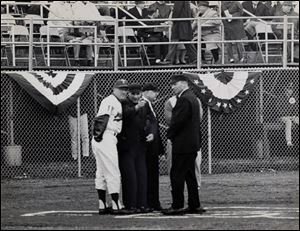
Mud Hens manager Frank Verdi meets with umpires before the opening day game in 1965 at the Lucas County Recreation Center.
“Technically, that’s probably not true,” he said. “Ned always considered it to be owned by Lucas County because of funding from the recreation board. But, in reality, because it was formed as a not-for-profit organization, I believe it is technically owned by its Board of Trustees. As a not-for-profit, by law we had to designate either a charity or a government entity to be the ultimate recipient of funds and assets if we dissolved. We picked Lucas County.”
Bracken said the team’s tax-exempt status is as “an agency of Lucas County” and that presumed county ownership is, perhaps, an “unintended consequence” of that. Regardless, nobody has to worry about the franchise dissolving these days or anytime soon.
In large part because of the late Gene Cook’s stewardship – he promoted heavily, sold a lot of advertising, and leveraged his political savvy into encouraging a far greater corporate participation in ticket revenue — Bracken said the accumulated net worth of the franchise grew from $50,000 in 1978 to nearly $1 million when the team left Maumee after the 2001 season for Fifth Third Field. Now, he said, the Mud Hens are “one of the best, if not the best financed team in the International League.”
So here we are, 50 years later. Wouldn’t Ned Skeldon, a visionary who turned an old race track grandstand into a baseball stadium, be proud of how his baby has grown up? Wouldn’t he think Fifth Third Field, still as nice as the day it opened, is the cat’s meow?
Oh, how he’d love to be here Friday to yell, “Play ball!”
Contact Blade sports columnist Dave Hackenberg at: dhack@theblade.com or 419-724-6398.